Diindolylmethane (DIM) is a natural substance produced in your gut after eating cruciferous vegetables such as broccoli and has been shown to be an effective treatment for chronic diseases (1, 2).
DIM has started picking up steam as a supplement of choice to deal with a variety of issues such as acne, PMS, mood swings, fibroids, menopause symptoms, and even things like man boobs. DIM restores healthy hormone balance by adjusting the balance of bad estrogens to good estrogens, and it blocks aromatase, which converts testosterone to estrogen.
Best Diindolylmethane (DIM)
1. Nutricost DIM
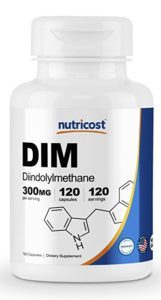
Nutricost’s 3rd party tested DIM supplement delivers a dosage on the higher end of the recommended usage with 300mg, but also has 5mg of BioPerine for increased absorption and bioavailability.
With vegetarian-friendly capsules, and a gluten-free, organic manufacturing process Nutricost DIM is by far one of the most superior products on the market today. For these reasons, it’s our #1 pick.
2. We Like Vitamins DIM
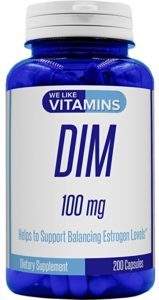
We Like Vitamins DIM provides a realistic dosage amount with a high amount of purity. We Like Vitamins provides a supplement that may be on the lower dosage end but has a purity that competes with higher-dose options available.
In terms of ingredients and purity, this supplement has very little added to it and only includes rice flour and gelatin. While this does make it less appealing for strict vegetarians, those looking for a minimalist formula will be happy.
3. Zhou DIM Active
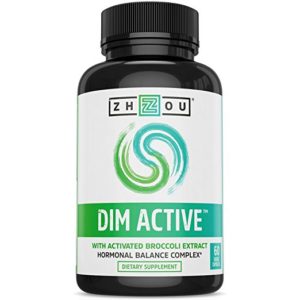
While it is not a prominent name in the supplement and healthcare industry, Zhou, has an interesting approach to DIM supplements. Unlike some of the other supplement options, they have chosen to take a more scientific approach to their formulation.
Zhou provides not only DIM, but broccoli seed extract, vitamin C, and vitamin E as well.
4. Bulk Supplements DIM
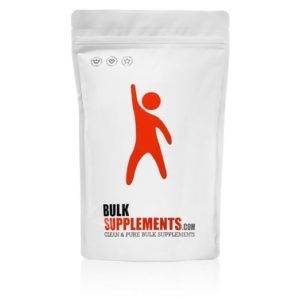
For those wanting the purest DIM option possible, this will be the most reliable. The only drawback of this particular option is the dosage required for the effective use of DIM.
As the optimal usage is quite minimal compared with other supplements, those who choose BulkSupplements will need a scale to measure the correct amount. This could prove to be a little tedious for some.
5. Smoky Mountain Nutrition DIM
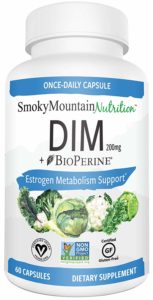
Though relatively unknown, SmokyMountain Nutrition prevails as a good DIM supplement option. With a dosage of 200mg per day and a 60-day supply, this option falls right in the middle for those looking for the most accurate dosage to take per day.
Being NON-GMO, Vegan.org certified, gluten-free certified, they are one of the few supplements that can claim these distinctions. This makes them one of the most friendly options for those who prefer a vegan or vegetarian option.
6. Zazzee Naturals DIM
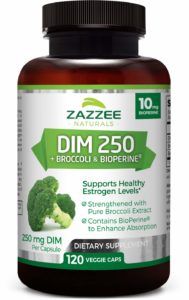
With a 250mg dosage and 120 capsules per bottle, consumers get amazing value for the price point. While this is not a choice that will work for those with a vegan or vegetarian preference, those who prefer a supplement manufactured in the best possible atmosphere may find this a suitable option.
Made in a GMP and FDA certified facility, there is a high degree of reliability that can be inferred with Zazzee Naturals.
7. Nature’s Way DIM-Plus
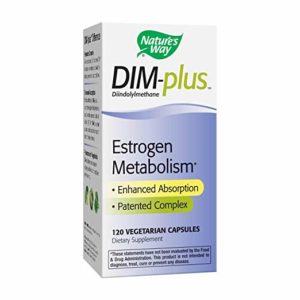
Nature’s Way DIM has a formula that is specifically designed to address the way a woman’s body processes estrogen. With its special formulation, it is a prime choice for women using DIM to treat conditions such as premenstrual syndrome or other hormone-related conditions.
Despite not being suited for everyone, however, this is great for any woman who wants a product that is hyper-focused on their health needs.
8. Dynamic Nutrition DIM
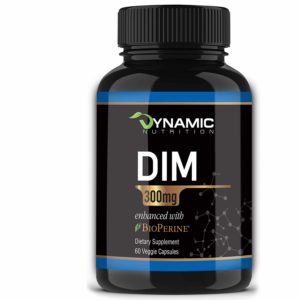
Dynamic Nutrition not only pairs their DIM with black pepper extract to increase absorption capabilities, but also touts a vegetarian-friendly, soy-free, dairy-free, and NON-GMO formulation.
This makes it one of the best options for those who want the benefits of the supplement without all of the additions that can often found in capsule forms.
9. Envy Nutrition Estrogen Balance DIM
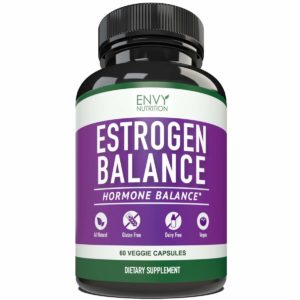
Made specifically for women, Envy Nutrition Estrogen Balance does not necessarily meet the same level of excellence found in Nature’s Way, but still provides a lot of benefits for women looking for a specially formulated supplement.
The natural, NON-GMO, Gluten-Free, vegetarian-friendly formulation also makes this a great choice across several different lifestyle types.
10. Genius Estrogen Balance DIM
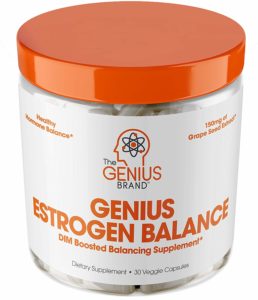
Genius DIM includes grape seed extract and BioPerine for increased bioavailability. Additionally, there is the addition of a cortisol manager and thyroid support to aid in thyroid hormone deficiencies and stress management.
The capsule is also vegetarian friendly.
How We Ranked
When reviewing the multiple DIM supplements available, we first looked for the proper dosages; not too high and not too low. The top ranked supplements above, including Zhou Nutrition and We Love Vitamins, all contain between 100mg to 300g. We chose this range because it falls inside the clinically effective dosages, while not proving too much as too allow for a possible overdose.
Next, we analyzed supporting ingredients. While we did prefer pure DIM supplements like Bulk Supplements offers, we did give bonus points for companies that included beneficial compounds that support DIM.
For example, out top pick, Nutricost DIM, included 5mg of Bioperine to increase the absorption, bioavailability and overall effectiveness of DIM. However since DIM can cause side effects at high doses, we axed products that contained both absorption increasing agents, combined with high levels of DIM.
Lastly we looked at the quality of the supplement. Products that contained unnecessary fillers were either removed or penalized. We only wanted pure, high quality DIM supplements for our rankings.
Benefits
1. DIM can help manage and possibly treat various cancers. According to a 2014 study conducted in Haifa, Israel, DIM was effective when preventing not only breast cancer but also prostate cancer when tested with animal models (3).
DIM inhibited the proliferation of and caused the death of cancer cells in both cases. Findings indicated significant clinical improvement against control groups, but it was also noted that no adverse side effects occurred during the study. DIM is also diverse enough as an anticancer agent to be used to treat uterine cancer. In a 2001 study, it was found to significantly interact with uterine cancer cells (4).
When administered to uterine cancer cells, both cell growth and cell density were markedly lower in the treated group as opposed to the control group. Researchers concluded that it had a strong anti-proliferative effect against cancer cells. Another area that has been extensively researched is DIM’s proficiency as a therapeutic treatment for prostate cancer (5).
According to a 2010 study, usage of DIM was both well-tolerated, and a moderate efficacy was demonstrated when used to treat prostate cancer that hadn’t yet metastasized (6).
In other words, it wasn’t a miracle treatment, but it helped when treating prostate cancer. It also didn’t have any legitimately bad side effects that happened when the treatment was administered. Another study posited that due to the way DIM affects cancer cells, engineering a treatment based on it that chemosensitizes cells can be developed (7).
Basically, DIM could help make existing cancer treatments more effective, helping to heal even aggressive cancers that are hard to treat with chemotherapy alone.
When taken as a supplement, DIM may be an effective preventative treatment for thyroid cancer. When tested in patients who had thyroid proliferative disease (TPD), DIM was found to both enhance estrogen metabolism and even serve as an antiestrogenic dietary supplement (8).
After 14 days of supplementation, DIM could be detected in thyroid tissue, serum, and urine of patients involved in the trial. Researchers concluded that because DIM was discovered within the thyroid tissue itself, its effects as an antiestrogenic agent could legitimately be used to treat thyroid cancer and other diseases of the thyroid.
The anti-estrogenic effects of DIM aren’t just limited to a certain arena. According to a 2011 study, it inhibited the proliferation of thyroid cancer cells as well as many of the internal events related to metastasis (the spread of cancer cells throughout the body) such as adhesion, migration, and invasion (9).
The researchers concluded that this could lead to either complete treatments or therapeutic dietary supplements being developed for thyroid cancer using DIM as a base. Many studies support the possible use of DIM as a therapy for cancers of the digestive and excretory system, like colon cancer. According to a recent (2016) review, DIM takes several different pathways to inhibit the growth and spread of such cancers (10).
It affects a range of factors from apoptosis (cell death) to metastasis (cancer spread) to angiogenesis (the formation of new blood pathways within a cancerous growth). It’s been shown to concretely induce apoptosis in colon cancer cells as well (11).
The same review stated that based on the evidence, it had a lot of potential to offer not just as an anticancer treatment, but also as a potential therapeutic agent to relieve some of cancer’s most unpleasant symptoms. Furthermore, DIM is perhaps even more effective as a treatment when combined with normal therapies for colorectal cancer.
In one study, DIM was combined with butyrate (a conventional chemopreventive treatment for cancer), and the anticancer effects of both were improved when the two were put together while treating colon cancer in mice (12).
Finally, DIM may simply just be a great colon cancer prevention supplement, even before a given patient is actually diagnosed with cancer. Eating cruciferous vegetables (the kind that contain DIM) has been linked with much lower levels of colon cancer (13).
2. DIM can be used to help treat enlarged prostate. Enlarged prostate, otherwise known as benign prostatic hyperplasia, is actually a complex bodily condition that doesn’t necessarily have any easy treatments (14).
However, a growing body of research suggests that DIM may be a possible avenue of treatment for the condition, though results as of yet are still inconsistent due to small sample sizes and inconsistent standard of experimentation (15).
More research is required to establish DIM as such a treatment, though the outlook so far is promising.
3. DIM can be used as a treatment for premenstrual syndrome (PMS). As a regulator of estrogen DIM may even help women regulate premenstrual syndrome by inhibiting estrogen production or at least minimizing any harmful effects associated with estrogen levels in the body. PMS has been shown to have a large effect on personality traits of women suffering from it, contributing not only with depressive symptoms but also with mood swings, food cravings and other erratic behaviors (16).
DIM supplementation may help certain women cope with the negative emotional effects of an unpleasant PMS experience (17).
This benefit, however, isn’t quite as well established as DIM’s effects as an anticancer regulator and as a treatment for conditions such as HPV and enlarged prostate. More research is needed to shed light onto DIM’s possible positive relationship with PMS.
4. DIM modulates the body’s estrogen production in a positive way. While DIM in some cases acts the same way that estrogen does, some research suggests that it may actually inhibit estrogen production when it gets to a harmful point in the body. That is exactly why DIM is such an effective treatment for so many different kinds of cancers; it regulates the body’s most harmful usage of estrogen in hormonal cancers and in doing so, helps to stop cancer cells from proliferating and growing, creating blood vessels to feed themselves, and more (18).
Such positive benefits apply not only to breast and uterine cancers, but also to prostate cancer, and thyroid cancer, among other varieties.
5. DIM might be able to fight human papillomavirus or HPV. DIM has been shown to help combat some of the effects of human papillomavirus (HPV). In one study, it helped treat recurrent respiratory papillomatosis (RRP), a common complication associated with HPV infection wherein cell growths spread throughout the respiratory system (19).
While normally a benign condition, it can prove fatal, especially in children if not appropriately treated (20).
One study found that it was an effective treatment for recurrent respiratory papillomatosis, even despite a mixed bag of responses. Some patients had a full and benign response to DIM treatment, while others responded only partially, and on others, it had no effect at all. Regardless, the evidence suggests that DIM is at least one potential option for treating RRP.
6. DIM can protect the liver. DIM exerts an anti-fibrosis, anti-tumor, antioxidant, immunomodulatory, detoxification, and anti-inflammation effects on liver protection. It also reduces microbial-induced liver injuries (21).
DIM ameliorates experimental liver fibrosis induced by thioacetamide in mice (22).
In one study, DIM blocked Hepatocellular Carcinoma (HCC) cell metastasis by suppressing tumor cell migration and invasion in mice (23).
DIM reduces steatosis and the progression of Nonalcoholic Steatohepatitis (NASH) in methionine-choline–diet-induced NASH in mice. This was by the induction of Treg dominance to reduce intrahepatic inflammation (24).
Diindolylmethane could effectively suppress acute liver inflammation caused by Staphylococcal Enterotoxin B (SEB) and thus reduced SEB-mediated liver injury in mice (25).
7. DIM may prevent weight gain. One 2011 study using Indole-3-Carbinol (the precursor to DIM) noted that 5mg injections into the gut daily was able to attenuate the expected gain in body fat associated with a high fat/calorie diet (26).
Side Effects
1. DIM might make hormone-based conditions, like endometriosis or certain cancers, worse. While DIM is often used as a treatment for hormone-based conditions and cancers, there is some concern that it may actually worsen certain hormone conditions because of the way it inhibits the production of estrogen in the body. In one study on breast cancer cells, for example, scientists found that low amounts of DIM actually increased cell growth and proliferation rather than inhibiting it (27).
It’s not clear exactly why this happens in some cases, or whether or not increasing the dosage of DIM would do the reverse and help treat cancerous cells, especially when the body of scientific evidence is overwhelmingly in favor of DIM supplementation as an effective cancer treatment, especially when combined with more conventional therapies. It could be due to DIM’s activation of certain estrogen mechanisms in the body. Regardless, users suffering from hormonal conditions should think carefully and thoroughly consult their doctor before starting to supplement with DIM.
2. DIM may cause mild nausea or diarrhea. According to one study, DIM caused nausea and diarrhea when tested with patients who had prostatic intraepithelial neoplasia (28).
That said, only three adverse events were recorded, and they occurred with only two patients out of a total of fourteen. And besides that result, the researchers concluded that DIM was indeed well tolerated, making it a relatively safe option for most patients who need to use it as a cancer treatment.
So in total, DIM’s possible negative effects on gastrointestinal health are probably few and far between. However, if you notice such symptoms shortly after starting a new regimen of DIM, it’s likely best to stop supplementing and see if they get better, as it could be a sign that DIM is not well-tolerated by your body.
3. DIM has been shown to affect the testes. According to one study, DIM had side effects on some sperm characteristics led to the histological degeneration of testicular tissues in male rats (29).
4. DIM could trigger an allergic reaction. DIM is commonly found in cruciferous vegetables such as broccoli, cauliflower, and cabbage. While allergies involving this specific food family are rare, those who are aware of an allergy or believe themselves to be at high-risk should be extremely cautious of consumption. Those taking DIM as a supplement should also be cautious.
As many supplements may contain substances that could trigger an allergic reaction, those with a history of immune system sensitivity should be mindful when starting to take a new supplement option. In general, most allergic reactions involving DIM are mild to moderate and could include symptoms such as hives, dizziness, or rashes.
5. DIM could lead to hyperglycemia. While research on this issue are fairly new, some indications suggest DIM could lead to hyperglycemia. Hyperglycemia is a condition in which too much blood sugar is left in the blood for an extended time. Hyperglycemia can damage the vessels that supply blood to vital organs and can lead to stroke, kidney disease, or even death.
According to a clinical study conducted in 2017, DIM enhances glucose intake using the activation of insulin signaling. A naturally occurring compound found in cruciferous vegetables, I3C, works in conjunction with DIM to reduce body mass and glucose levels. After using a mixture of various methods, it was discovered that the insulin receptors found in the body were enhanced when DIM was more prevalent. Though this study was conducted on animal subjects, there have been a few started involving humans (30).
It’s important for those who have bee diagnosed with diabetes or have a history of blood sugar issues to be aware of this possibility, regardless of the novelty. Additionally, those with diabetes who choose to take DIM should consistently monitor their blood sugar levels and consult a physician in the event they see concerning changes.
Recommended Dosage
A supplemental dose of approximately 100mg DIM has been noted to alter urinary estrogens in a manner thought to reflect less estrogenicity. There is as of yet, no recommended dosage for DIM offered by governing bodies like the CDC or the FDA for cancer treatments.
The right dosage depends on what condition is being treated, as well as the user’s health at the time. Though like any other supplement, starting small and slowly ramping up the dosage is probably the best option.
Diindolylmethane is well tolerated at single doses of up to 200 mg, according to a randomized study conducted in healthy subjects (30).
Also, oral DIM at 2mg/kg/day is well tolerated with no significant toxicity according to another randomized controlled pilot study (31).
FAQ
Do I need to supplement with DIM? No, nobody absolutely needs to supplement with DIM. DIM is naturally produced by your body, and it can also be found as an ingredient in cruciferous vegetables, so supplementing with it isn’t necessary. Eating cruciferous vegetables is also associated with a wide range of health benefits that one may not necessarily get if you only take DIM by supplement, such as improved cardiovascular health (32).
However, supplementing does have very real uses for some treatment cases, such as preventing cancer treatments. Simply eating vegetables may not give you a high enough dosage of DIM for you to reap the anticancer benefits in such a case.
Can I take DIM if I’m pregnant? Unfortunately, DIM’s effects have not been established in terms of pregnant or breastfeeding women. As a supplement that changes the way your body produces and uses hormones, DIM is not a good choice for pregnant women. In particular, DIM has been noted as a supplement that has a large effect on the way your body produces and uses estrogen, which could be dangerous for the health of a fetus. Testosterone and estrogen levels play a big part in any healthy pregnancy.
Will DIM solve cancer if I already have it? Unfortunately, DIM isn’t some kind of magical treatment for cancer. Taking huge doses of DIM without consulting your doctor is probably not the best way to treat a case of cancer. However, as stated in this article, DIM does have marked anticancer effects, and it’s been shown to be effective not just in preventing cancer in the first place, but also in treating it and improving the efficacy of other anticancer treatments, such as chemotherapy.
It can be a part of a comprehensive treatment plan. That said, if you’re already on a cancer treatment regimen, it’s best to contact your doctor about supplementing with DIM to avoid any possible interactions or unforeseen consequences with the rest of your treatment.
Is DIM safe to take? Yes, DIM is safe to take. In the great majority of its listed clinical trials, essentially no side effects or drug interactions have been noted. The worst that’s been listed has been a mild case of diarrhea or nausea.
Can kids take DIM? DIM has not yet been established as a safe supplement for children, especially young ones. One study from 2009 found that, when tested on immature rats, even abnormally high doses of DIM didn’t have any adverse effects on the rats or their hormonal systems (34).
That said, this study in particular only aimed to establish DIM’s safety as a treatment for recurrent respiratory papilloma (RRP), a possible complication resulting from HPV. There are still not very many DIM studies that incorporate immature subjects. That’s especially true when it comes to possible human subjects. As such, children should refrain from taking DIM unless it’s specifically offered as a treatment for RRP by a qualified doctor.
Does DIM have any drug interactions I should know about? While it’s not clear exactly what drug interactions DIM supplement users may need to worry about, research shows that it does activate certain receptors in the human body (namely the CYP3A4 and MDR1 genes) that are sometimes used to transport and metabolize drugs (35).
As such, users should only take DIM after contacting their doctor about it if they are also taking other medications on a regular basis.
What is the best time of day to take DIM? While there is no established best time of day to take DIM, like most supplements it can safely be taken after meals, a couple of times a day depending upon the dosage. Especially if it’s a new supplement that a user has just started, taking it on a totally empty stomach is not recommended.
Can I take DIM if I have a liver or kidney disease? Unfortunately, taking DIM while you have a liver or kidney disease may not be the best idea. That’s because of the fact that DIM may inhibit certain kinds of enzymes that are present in or created by your liver which regulate your body’s toxins and metabolic processes.
Furthermore, just like for pregnant women, DIM’s effects on people who suffer from a liver or kidney disease haven’t really been very well-researched, so there isn’t concrete evidence on exactly how dangerous such supplementation may be and in what way. As such, if you suffer from a liver or kidney disease, it’s best to contact your doctor or specialist before starting any new DIM supplementation.
Does DIM lower testosterone? No, DIM does not lower testosterone. DIM inhibits aromatase, which is an enzyme that converts testosterone into estrogen.
Can DIM help with acne? DIM helps improve—and even eliminate—acne by preventing potentially harmful androgens from getting into their receptors.
Does DIM change urine color? DIM supplements or DIM-rich foods can change the color of your urine. The darkened urine, as a result of DIM intake, is often tea-colored or dark brown. While this can be an alarming side effect, it is a natural result of increased consumption of DIM.
Is DIM bad for the thyroid? To date, no human study has been published regarding the bioavailability of DIM in thyroid tissue or its effects in proliferative thyroid disease.
Can Dim cause liver damage? There is no evidence to link DIM and liver damage.
Does DIM prevent breast cancer? There is no conclusive evidence it 100% prevents breast cancer. Studies suggest that DIM may benefit patients with castration-resistant prostate cancer and help reverse cervical intraepithelial neoplasia. DIM supplementation resulted in changes in estrogen urinary metabolites in post-menopausal women with a history of early-stage breast cancer.
Does DIM cause hot flashes? No, in fact, it helps manage it. DIM promotes proper hormone metabolism and helps improve estrogen/ progesterone equilibrium to steady the hot flashes and related symptoms.
What foods contain DIM? DIM and its precursors can be found in a number of cruciferous vegetables, including broccoli, Brussels sprouts, cabbage, cauliflower, collard greens, kale, kohlrabi, mustard greens, radish, rutabaga, and turnip.
Can I take DIM if I’m breastfeeding? Yes, DIM is considered relatively safe when breastfeeding; however, nursing mothers should be careful in terms of the amount they consume. DIM levels found naturally in food are likely to be safe according to research. Taking amounts that exceed this, however, have little to no research information available, so mothers should avoid consuming higher than normal levels to avoid any unforeseen effects.
Can DIM cause general hormonal disturbances? Yes, DIM can have effects on hormones within the body. DIM is considered to be a prime element in hormone regulation and can do this for both men and women. This disturbance in hormones before regulation could cause very effects, though, most are mild and short-term.
Can DIM help with anxiety? Yes, DIM can assist with symptoms related to anxiety. Similar to depression, DIM’s hormone regulation properties make it a prime component for use in the treatment of anxiety. As hormones are brought to regular and safe levels, the body’s functioning abilities are also enhanced and increased.
How long does it take for DIM supplements to work? Ultimately, this will vary from person to person, but most users report seeing changes within the span of 1 -2 weeks. In terms of absorption, however, the human body will fully absorb the compound with the first 2 hours of consumption.
Can DIM help with insomnia? Yes, as sleep is very closely related to the hormone levels in the body, those experiencing symptoms of insomnia can look to DIM for possible assistance with regulating their sleep cycles.
Can DIM help with vision loss? Unfortunately, there are no current studies to analyze or suggest that DIM has a significant impact on vision quality or loss. Those who would like to explore this possibility should consult their physician to confirm the validity of any claims they have come across concerning vision and DI supplementation.
Is it possible to take too much DIM? Currently, there are very few long-term clinical studies regarding DIM. While lower levels of DIM intake are beneficial, higher amounts tend to cause a variety of side effects, including abdominal discomfort, gas, and bloating. Those taking DIM as a supplement should be very cautious of the amount consumed and adhere to recommend the use
How bioavailable is DIM? The bioavailability of DIM depends primarily on the type ingested. However, there are many studies to suggest that DIM has poor soluble. This can change, however, based on the source of DIM. Dim from food sources tend to be much more successful than supplementation methods.
Can you be allergic to DIM? Yes, in general, however, reactions should be extremely mild as DIM is a naturally occurring function of the human body. Most allergic reactions stem from reactivity to the food being consumed if DIM is being derived from natural sources. Allergic reactions to supplements are also relatively rare, but can usually be attributed to the ingredients in the manufacturing of the supplement.
Does DIM have any effect on those with diabetes? Yes, DIM can have some very substantial effects on those with diabetes. As blood sugar is a primary concern for those suffering from diabetes, supplementation with DIM should be closely monitored. DIM regulates the body’s hormones. Changes in progesterone and estrogen levels can affect blood sugar control. When estrogen levels increase, the body tends to become more insulin sensitive; conversely, if progesterone increases, there is an increase in insulin resistance.
Recap
DIM, a substance that can be normally found in cruciferous vegetables such as bok choy, has numerous health benefits and generally isn’t associated with a bevy of negative side effects. DIM doesn’t only prevent cancer when taken in regularly but also acts as an anticancer agent even in patients who are currently diagnosed with cancer or going through a treatment regimen for it. It also generally increases the efficacy of other, more conventional cancer treatments, such as chemotherapy. In addition, DIM can help treat other conditions as well, such as enlarged prostate or human papillomavirus (HPV).
Despite being well-tolerated in clinical trials, DIM’s side effects haven’t been extensively studied, with only a select few studies looking into its possibility for adverse effects. As such, pregnant women, breastfeeding women, and those suffering from hormonal diseases should always contact their doctor if they are considering starting a round of DIM supplementation.
For Healthtrends #1 DIM recommendation, click here.
